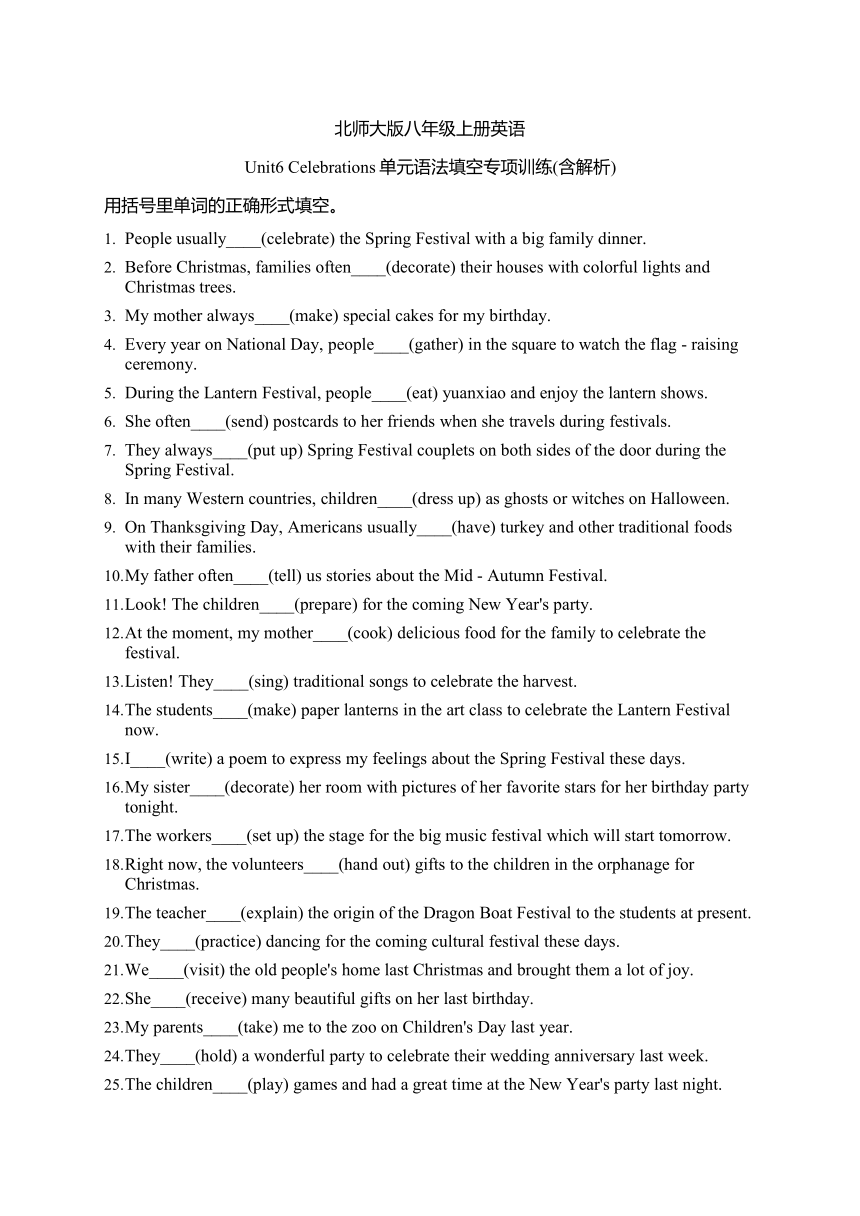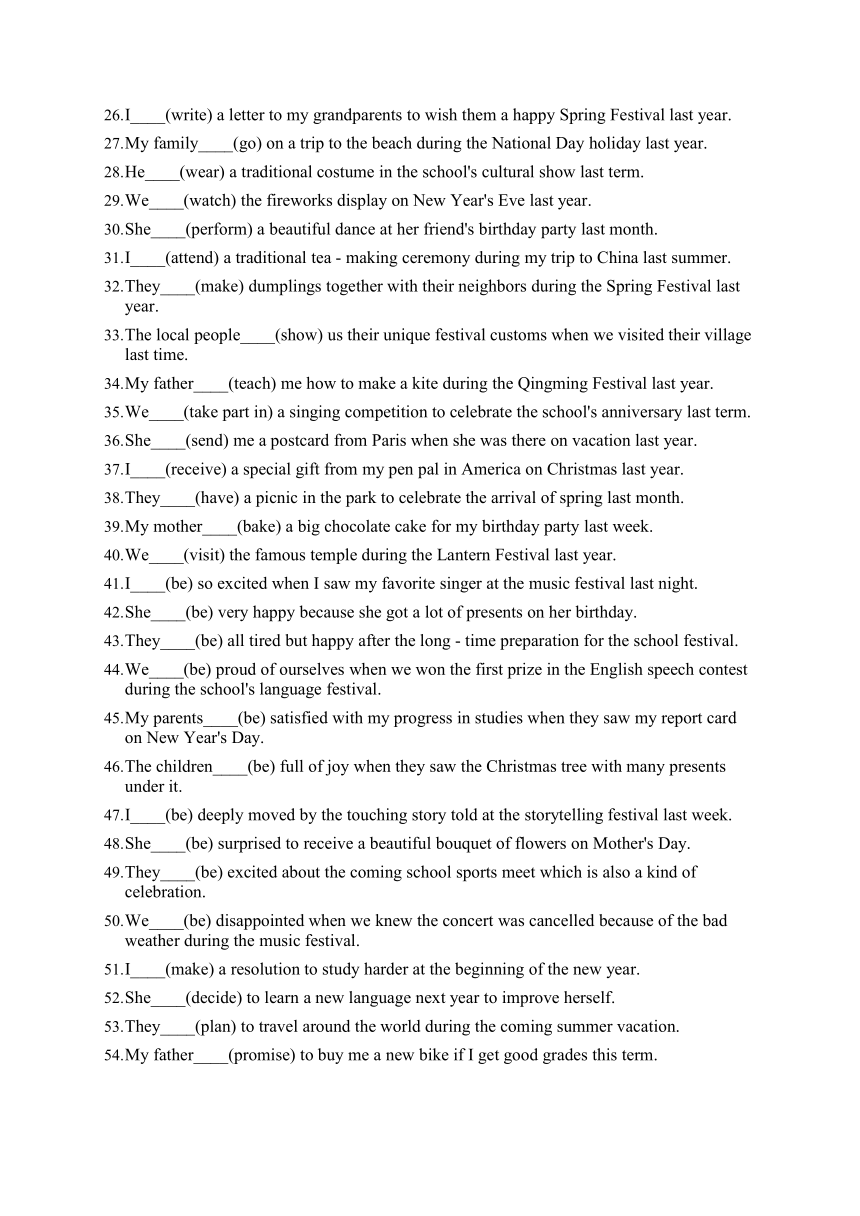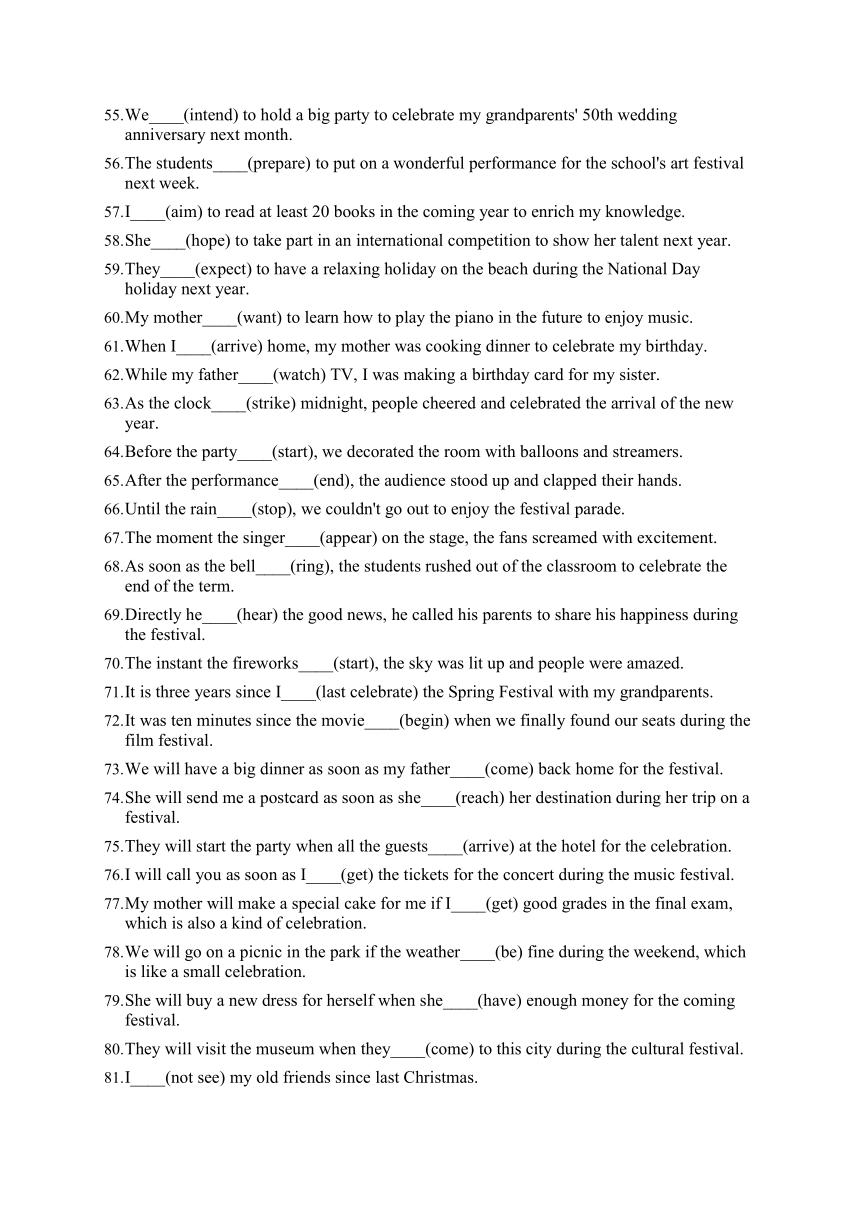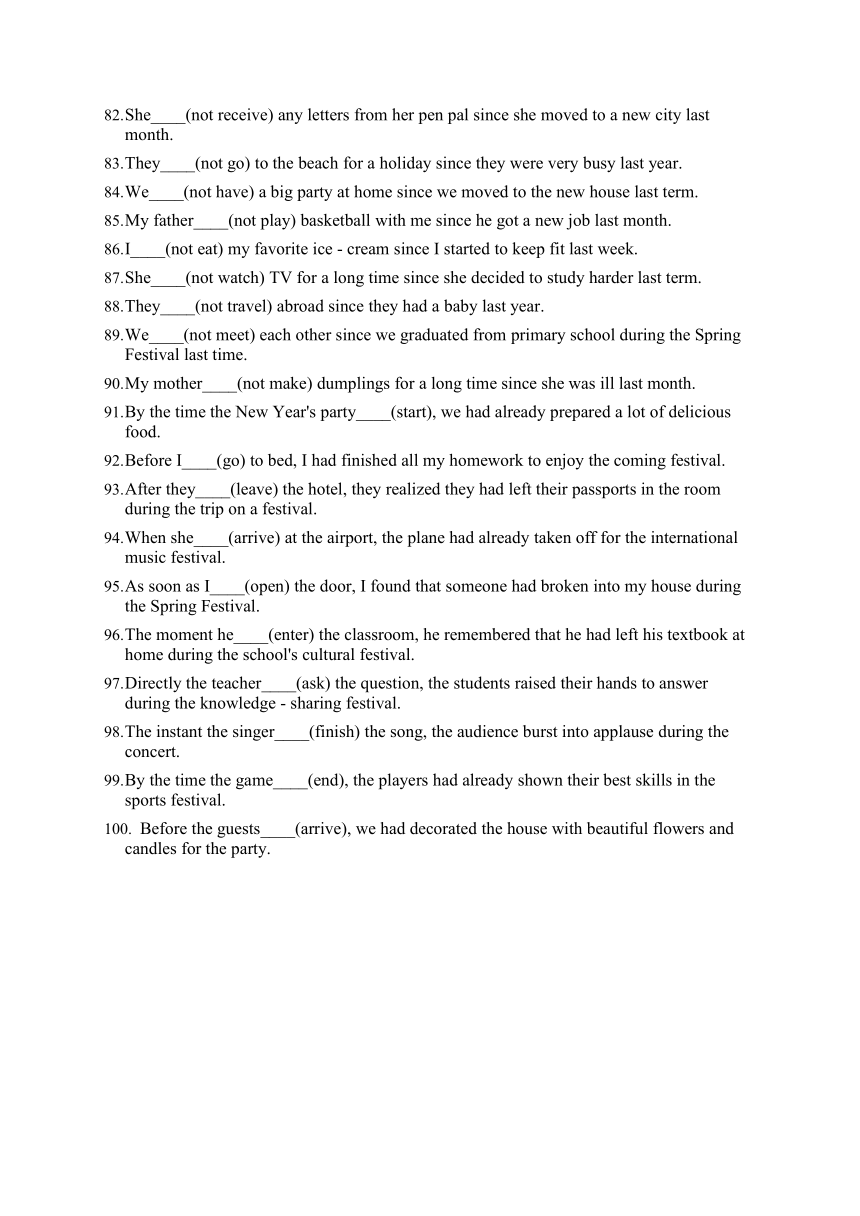Unit6 Celebrations单元语法填空专项训练100题(含解析)北师大版八年级上册英语
文档属性
| 名称 | Unit6 Celebrations单元语法填空专项训练100题(含解析)北师大版八年级上册英语 |  | |
| 格式 | docx | ||
| 文件大小 | 22.5KB | ||
| 资源类型 | 教案 | ||
| 版本资源 | 北师大版 | ||
| 科目 | 英语 | ||
| 更新时间 | 2025-08-18 22:17:58 | ||
图片预览




文档简介
北师大版八年级上册英语
Unit6 Celebrations单元语法填空专项训练(含解析)
用括号里单词的正确形式填空。
People usually____(celebrate) the Spring Festival with a big family dinner.
Before Christmas, families often____(decorate) their houses with colorful lights and Christmas trees.
My mother always____(make) special cakes for my birthday.
Every year on National Day, people____(gather) in the square to watch the flag - raising ceremony.
During the Lantern Festival, people____(eat) yuanxiao and enjoy the lantern shows.
She often____(send) postcards to her friends when she travels during festivals.
They always____(put up) Spring Festival couplets on both sides of the door during the Spring Festival.
In many Western countries, children____(dress up) as ghosts or witches on Halloween.
On Thanksgiving Day, Americans usually____(have) turkey and other traditional foods with their families.
My father often____(tell) us stories about the Mid - Autumn Festival.
Look! The children____(prepare) for the coming New Year's party.
At the moment, my mother____(cook) delicious food for the family to celebrate the festival.
Listen! They____(sing) traditional songs to celebrate the harvest.
The students____(make) paper lanterns in the art class to celebrate the Lantern Festival now.
I____(write) a poem to express my feelings about the Spring Festival these days.
My sister____(decorate) her room with pictures of her favorite stars for her birthday party tonight.
The workers____(set up) the stage for the big music festival which will start tomorrow.
Right now, the volunteers____(hand out) gifts to the children in the orphanage for Christmas.
The teacher____(explain) the origin of the Dragon Boat Festival to the students at present.
They____(practice) dancing for the coming cultural festival these days.
We____(visit) the old people's home last Christmas and brought them a lot of joy.
She____(receive) many beautiful gifts on her last birthday.
My parents____(take) me to the zoo on Children's Day last year.
They____(hold) a wonderful party to celebrate their wedding anniversary last week.
The children____(play) games and had a great time at the New Year's party last night.
I____(write) a letter to my grandparents to wish them a happy Spring Festival last year.
My family____(go) on a trip to the beach during the National Day holiday last year.
He____(wear) a traditional costume in the school's cultural show last term.
We____(watch) the fireworks display on New Year's Eve last year.
She____(perform) a beautiful dance at her friend's birthday party last month.
I____(attend) a traditional tea - making ceremony during my trip to China last summer.
They____(make) dumplings together with their neighbors during the Spring Festival last year.
The local people____(show) us their unique festival customs when we visited their village last time.
My father____(teach) me how to make a kite during the Qingming Festival last year.
We____(take part in) a singing competition to celebrate the school's anniversary last term.
She____(send) me a postcard from Paris when she was there on vacation last year.
I____(receive) a special gift from my pen pal in America on Christmas last year.
They____(have) a picnic in the park to celebrate the arrival of spring last month.
My mother____(bake) a big chocolate cake for my birthday party last week.
We____(visit) the famous temple during the Lantern Festival last year.
I____(be) so excited when I saw my favorite singer at the music festival last night.
She____(be) very happy because she got a lot of presents on her birthday.
They____(be) all tired but happy after the long - time preparation for the school festival.
We____(be) proud of ourselves when we won the first prize in the English speech contest during the school's language festival.
My parents____(be) satisfied with my progress in studies when they saw my report card on New Year's Day.
The children____(be) full of joy when they saw the Christmas tree with many presents under it.
I____(be) deeply moved by the touching story told at the storytelling festival last week.
She____(be) surprised to receive a beautiful bouquet of flowers on Mother's Day.
They____(be) excited about the coming school sports meet which is also a kind of celebration.
We____(be) disappointed when we knew the concert was cancelled because of the bad weather during the music festival.
I____(make) a resolution to study harder at the beginning of the new year.
She____(decide) to learn a new language next year to improve herself.
They____(plan) to travel around the world during the coming summer vacation.
My father____(promise) to buy me a new bike if I get good grades this term.
We____(intend) to hold a big party to celebrate my grandparents' 50th wedding anniversary next month.
The students____(prepare) to put on a wonderful performance for the school's art festival next week.
I____(aim) to read at least 20 books in the coming year to enrich my knowledge.
She____(hope) to take part in an international competition to show her talent next year.
They____(expect) to have a relaxing holiday on the beach during the National Day holiday next year.
My mother____(want) to learn how to play the piano in the future to enjoy music.
When I____(arrive) home, my mother was cooking dinner to celebrate my birthday.
While my father____(watch) TV, I was making a birthday card for my sister.
As the clock____(strike) midnight, people cheered and celebrated the arrival of the new year.
Before the party____(start), we decorated the room with balloons and streamers.
After the performance____(end), the audience stood up and clapped their hands.
Until the rain____(stop), we couldn't go out to enjoy the festival parade.
The moment the singer____(appear) on the stage, the fans screamed with excitement.
As soon as the bell____(ring), the students rushed out of the classroom to celebrate the end of the term.
Directly he____(hear) the good news, he called his parents to share his happiness during the festival.
The instant the fireworks____(start), the sky was lit up and people were amazed.
It is three years since I____(last celebrate) the Spring Festival with my grandparents.
It was ten minutes since the movie____(begin) when we finally found our seats during the film festival.
We will have a big dinner as soon as my father____(come) back home for the festival.
She will send me a postcard as soon as she____(reach) her destination during her trip on a festival.
They will start the party when all the guests____(arrive) at the hotel for the celebration.
I will call you as soon as I____(get) the tickets for the concert during the music festival.
My mother will make a special cake for me if I____(get) good grades in the final exam, which is also a kind of celebration.
We will go on a picnic in the park if the weather____(be) fine during the weekend, which is like a small celebration.
She will buy a new dress for herself when she____(have) enough money for the coming festival.
They will visit the museum when they____(come) to this city during the cultural festival.
I____(not see) my old friends since last Christmas.
She____(not receive) any letters from her pen pal since she moved to a new city last month.
They____(not go) to the beach for a holiday since they were very busy last year.
We____(not have) a big party at home since we moved to the new house last term.
My father____(not play) basketball with me since he got a new job last month.
I____(not eat) my favorite ice - cream since I started to keep fit last week.
She____(not watch) TV for a long time since she decided to study harder last term.
They____(not travel) abroad since they had a baby last year.
We____(not meet) each other since we graduated from primary school during the Spring Festival last time.
My mother____(not make) dumplings for a long time since she was ill last month.
By the time the New Year's party____(start), we had already prepared a lot of delicious food.
Before I____(go) to bed, I had finished all my homework to enjoy the coming festival.
After they____(leave) the hotel, they realized they had left their passports in the room during the trip on a festival.
When she____(arrive) at the airport, the plane had already taken off for the international music festival.
As soon as I____(open) the door, I found that someone had broken into my house during the Spring Festival.
The moment he____(enter) the classroom, he remembered that he had left his textbook at home during the school's cultural festival.
Directly the teacher____(ask) the question, the students raised their hands to answer during the knowledge - sharing festival.
The instant the singer____(finish) the song, the audience burst into applause during the concert.
By the time the game____(end), the players had already shown their best skills in the sports festival.
Before the guests____(arrive), we had decorated the house with beautiful flowers and candles for the party.
答案解析
celebrate解析:usually(通常)是一般现在时的标志,主语people为复数,谓语动词用原形。
decorate解析:often(经常)体现一般现在时,主语families为复数,谓语动词用原形。
makes解析:always(总是)表一般现在时,主语my mother为第三人称单数,谓语动词用第三人称单数形式。
gather解析:every year(每年)是一般现在时标志,主语people为复数,谓语动词用原形。
eat解析:during the Lantern Festival(在元宵节期间)描述习惯性动作,用一般现在时,主语people为复数,谓语用原形。
sends解析:often(经常)表一般现在时,主语she为第三人称单数,谓语动词用第三人称单数形式。
put up解析:always(总是)体现一般现在时,主语they为复数,谓语动词用原形。
dress up解析:描述西方节日的习惯性做法,用一般现在时,主语children为复数,谓语用原形。
have解析:usually(通常)表一般现在时,主语Americans为复数,谓语动词用原形。
tells解析:often(经常)体现一般现在时,主语my father为第三人称单数,谓语动词用第三人称单数形式。
are preparing解析:look(看)是现在进行时的标志,结构为am/is/are + doing;主语the children为复数,用are。
is cooking解析:at the moment(此刻)表现在进行时,主语my mother为第三人称单数,用is + doing。
are singing解析:listen(听)是现在进行时标志,主语they为复数,用are + doing。
are making解析:now(现在)表现在进行时,主语the students为复数,用are + doing。
am writing解析:these days(这些天)强调动作正在进行,用现在进行时;主语I对应am + doing。
is decorating解析:语境暗示“正在为今晚的派对装饰”,用现在进行时;主语my sister为第三人称单数,用is + doing。
are setting up解析:描述“工人们正在搭建舞台”,用现在进行时;主语the workers为复数,用are + doing。
are handing out解析:right now(此刻)表现在进行时,主语the volunteers为复数,用are + doing。
is explaining解析:at present(目前)表现在进行时,主语the teacher为第三人称单数,用is + doing。
are practicing解析:these days(这些天)强调动作持续进行,用现在进行时;主语they为复数,用are + doing。
visited解析:last Christmas(去年圣诞节)是一般过去时标志,谓语动词用过去式。
received解析:last birthday(上次生日)表过去时间,用一般过去时,receive的过去式为received。
took解析:last year(去年)是一般过去时标志,take的过去式为took。
held解析:last week(上周)表过去时间,hold的过去式为held。
played解析:last night(昨晚)是一般过去时标志,and连接并列谓语,与had保持时态一致,用过去式。
wrote解析:last year(去年)表过去时间,write的过去式为wrote。
went解析:last year(去年)是一般过去时标志,go的过去式为went。
wore解析:last term(上学期)表过去时间,wear的过去式为wore。
watched解析:last year(去年)是一般过去时标志,watch的过去式为watched。
performed解析:last month(上个月)表过去时间,perform的过去式为performed。
attended解析:last summer(去年夏天)是一般过去时标志,attend的过去式为attended。
made解析:last year(去年)表过去时间,make的过去式为made。
showed解析:last time(上次)表过去时间,show的过去式为showed。
taught解析:last year(去年)是一般过去时标志,teach的过去式为taught。
took part in解析:last term(上学期)表过去时间,take的过去式为took,短语保持不变。
sent解析:last year(去年)表过去时间,send的过去式为sent。
received解析:last year(去年)是一般过去时标志,receive的过去式为received。
had解析:last month(上个月)表过去时间,have的过去式为had。
baked解析:last week(上周)表过去时间,bake的过去式为baked。
visited解析:last year(去年)是一般过去时标志,visit的过去式为visited。
was解析:last night(昨晚)表过去时间,主语I对应be动词的过去式was。
was解析:描述过去的状态,主语she为第三人称单数,be动词用was。
were解析:描述过去的状态,主语they为复数,be动词用were。
were解析:描述过去的状态,主语we为复数,be动词用were。
were解析:描述过去的状态,主语my parents为复数,be动词用were。
were解析:描述过去的状态,主语the children为复数,be动词用were。
was解析:描述过去的状态,主语I对应be动词的过去式was。
was解析:描述过去的状态,主语she为第三人称单数,be动词用was。
were解析:描述过去的状态(“当时很兴奋”),主语they为复数,be动词用were。
were解析:描述过去的状态,主语we为复数,be动词用were。
made解析:at the beginning of the new year(新年伊始)表过去时间,make的过去式为made。
has decided解析:“决定”的动作发生在过去,且对现在有影响(计划明年学语言),用现在完成时;主语she为第三人称单数,用has + 过去分词。
are planning解析:“正在计划”表现在进行时,主语they为复数,用are + doing。
has promised解析:“承诺”的动作发生在过去,且对现在有影响(条件是取得好成绩),用现在完成时;主语my father为第三人称单数,用has + 过去分词。
intend解析:描述当前的打算,用一般现在时;主语we为复数,谓语用原形。
are preparing解析:“正在准备下周的表演”表现在进行时表将来,主语the students为复数,用are + doing。
aim解析:描述当前的目标,用一般现在时;主语I为第一人称,谓语用原形。
hopes解析:描述当前的希望,用一般现在时;主语she为第三人称单数,谓语用第三人称单数形式。
expect解析:描述当前的期待,用一般现在时;主语they为复数,谓语用原形。
wants解析:描述当前的想法,用一般现在时;主语my mother为第三人称单数,谓语用第三人称单数形式。
arrived解析:when引导的时间状语从句,主句用过去进行时(was cooking),从句用一般过去时,arrive的过去式为arrived。
was watching解析:while引导的从句用过去进行时,与主句(was making)保持时态一致,表同时进行的动作;主语my father为第三人称单数,用was + doing。
struck解析:as引导的时间状语从句,描述过去发生的动作,strike的过去式为struck。
started解析:before引导的从句,主句用一般过去时(decorated),从句也用一般过去时,start的过去式为started。
ended解析:after引导的从句,主句用一般过去时(stood up),从句也用一般过去时,end的过去式为ended。
stopped解析:until引导的从句,主句用过去式(couldn't go),从句用一般过去时,stop的过去式为stopped。
appeared解析:the moment引导的从句,主句用一般过去时(screamed),从句也用一般过去时,appear的过去式为appeared。
rang解析:as soon as引导的从句,主句用一般过去时(rushed),从句也用一般过去时,ring的过去式为rang。
heard解析:directly引导的从句,主句用一般过去时(called),从句也用一般过去时,hear的过去式为heard。
started解析:the instant引导的从句,主句用一般过去时(was lit up),从句也用一般过去时,start的过去式为started。
last celebrated解析:It is + 时间 + since从句,从句用一般过去时,celebrate的过去式为celebrated。
had begun解析:It was + 时间 + since从句,从句用过去完成时,begin的过去分词为begun。
comes解析:as soon as引导的时间状语从句,主句用一般将来时(will have),从句用一般现在时表将来;主语my father为第三人称单数,用comes。
reaches解析:as soon as引导的从句,主句用一般将来时(will send),从句用一般现在时表将来;主语she为第三人称单数,用reaches。
arrive解析:when引导的从句,主句用一般将来时(will start),从句用一般现在时表将来;主语all the guests为复数,用arrive。
get解析:as soon as引导的从句,主句用一般将来时(will call),从句用一般现在时表将来;主语I为第一人称,用get。
get解析:if引导的条件状语从句,主句用一般将来时(will make),从句用一般现在时表将来;主语I为第一人称,用get。
is解析:if引导的条件状语从句,主句用一般将来时(will go),从句用一般现在时表将来;主语the weather为不可数名词,用is。
has解析:when引导的从句,主句用一般将来时(will buy),从句用一般现在时表将来;主语she为第三人称单数,用has。
come解析:when引导的从句,主句用一般将来时(will visit),从句用一般现在时表将来;主语they为复数,用come。
haven't seen解析:since last Christmas(自从去年圣诞节)是现在完成时标志,否定形式为haven't + 过去分词;see的过去分词为seen。
hasn't received解析:since引导的时间状语(last month),用现在完成时;主语she为第三人称单数,否定形式为hasn't + 过去分词。
haven't gone解析:since引导的时间状语(last year),用现在完成时;主语they为复数,否定形式为haven't + 过去分词。
haven't had解析:since引导的时间状语(last term),用现在完成时;主语we为复数,否定形式为haven't + 过去分词。
hasn't played解析:since引导的时间状语(last month),用现在完成时;主语my father为第三人称单数,否定形式为hasn't + 过去分词。
haven't eaten解析:since引导的时间状语(last week),用现在完成时;主语I为第一人称,否定形式为haven't + 过去分词。
hasn't watched解析:since引导的时间状语(last term),用现在完成时;主语she为第三人称单数,否定形式为hasn't + 过去分词。
haven't traveled解析:since引导的时间状语(last year),用现在完成时;主语they为复数,否定形式为haven't + 过去分词。
haven't met解析:since引导的时间状语(last time),用现在完成时;主语we为复数,否定形式为haven't + 过去分词。
hasn't made解析:since引导的时间状语(last month),用现在完成时;主语my mother为第三人称单数,否定形式为hasn't + 过去分词。
started解析:by the time引导的从句,主句用过去完成时(had prepared),从句用一般过去时,start的过去式为started。
went解析:before引导的从句,主句用过去完成时(had finished),从句用一般过去时,go的过去式为went。
left解析:after引导的从句,主句用一般过去时(realized),从句用过去完成时(had left),但此处after后接的动作“离开”发生在“意识到”之前,用过去式left(与had left呼应)。
arrived解析:when引导的从句,主句用过去完成时(had taken off),从句用一般过去时,arrive的过去式为arrived。
opened解析:as soon as引导的从句,主句用一般过去时(found),且宾语从句用过去完成时(had broken),从句用一般过去时,open的过去式为opened。
entered解析:the moment引导的从句,主句用一般过去时(remembered),且宾语从句用过去完成时(had left),从句用一般过去时,enter的过去式为entered。
asked解析:directly引导的从句,主句用一般过去时(raised),从句用一般过去时,ask的过去式为asked。
finished解析:the instant引导的从句,主句用一般过去时(burst),从句用一般过去时,finish的过去式为finished。
ended解析:by the time引导的从句,主句用过去完成时(had shown),从句用一般过去时,end的过去式为ended。
arrived解析:before引导的从句,主句用过去完成时(had decorated),从句用一般过去时,arrive的过去式为arrived。
Unit6 Celebrations单元语法填空专项训练(含解析)
用括号里单词的正确形式填空。
People usually____(celebrate) the Spring Festival with a big family dinner.
Before Christmas, families often____(decorate) their houses with colorful lights and Christmas trees.
My mother always____(make) special cakes for my birthday.
Every year on National Day, people____(gather) in the square to watch the flag - raising ceremony.
During the Lantern Festival, people____(eat) yuanxiao and enjoy the lantern shows.
She often____(send) postcards to her friends when she travels during festivals.
They always____(put up) Spring Festival couplets on both sides of the door during the Spring Festival.
In many Western countries, children____(dress up) as ghosts or witches on Halloween.
On Thanksgiving Day, Americans usually____(have) turkey and other traditional foods with their families.
My father often____(tell) us stories about the Mid - Autumn Festival.
Look! The children____(prepare) for the coming New Year's party.
At the moment, my mother____(cook) delicious food for the family to celebrate the festival.
Listen! They____(sing) traditional songs to celebrate the harvest.
The students____(make) paper lanterns in the art class to celebrate the Lantern Festival now.
I____(write) a poem to express my feelings about the Spring Festival these days.
My sister____(decorate) her room with pictures of her favorite stars for her birthday party tonight.
The workers____(set up) the stage for the big music festival which will start tomorrow.
Right now, the volunteers____(hand out) gifts to the children in the orphanage for Christmas.
The teacher____(explain) the origin of the Dragon Boat Festival to the students at present.
They____(practice) dancing for the coming cultural festival these days.
We____(visit) the old people's home last Christmas and brought them a lot of joy.
She____(receive) many beautiful gifts on her last birthday.
My parents____(take) me to the zoo on Children's Day last year.
They____(hold) a wonderful party to celebrate their wedding anniversary last week.
The children____(play) games and had a great time at the New Year's party last night.
I____(write) a letter to my grandparents to wish them a happy Spring Festival last year.
My family____(go) on a trip to the beach during the National Day holiday last year.
He____(wear) a traditional costume in the school's cultural show last term.
We____(watch) the fireworks display on New Year's Eve last year.
She____(perform) a beautiful dance at her friend's birthday party last month.
I____(attend) a traditional tea - making ceremony during my trip to China last summer.
They____(make) dumplings together with their neighbors during the Spring Festival last year.
The local people____(show) us their unique festival customs when we visited their village last time.
My father____(teach) me how to make a kite during the Qingming Festival last year.
We____(take part in) a singing competition to celebrate the school's anniversary last term.
She____(send) me a postcard from Paris when she was there on vacation last year.
I____(receive) a special gift from my pen pal in America on Christmas last year.
They____(have) a picnic in the park to celebrate the arrival of spring last month.
My mother____(bake) a big chocolate cake for my birthday party last week.
We____(visit) the famous temple during the Lantern Festival last year.
I____(be) so excited when I saw my favorite singer at the music festival last night.
She____(be) very happy because she got a lot of presents on her birthday.
They____(be) all tired but happy after the long - time preparation for the school festival.
We____(be) proud of ourselves when we won the first prize in the English speech contest during the school's language festival.
My parents____(be) satisfied with my progress in studies when they saw my report card on New Year's Day.
The children____(be) full of joy when they saw the Christmas tree with many presents under it.
I____(be) deeply moved by the touching story told at the storytelling festival last week.
She____(be) surprised to receive a beautiful bouquet of flowers on Mother's Day.
They____(be) excited about the coming school sports meet which is also a kind of celebration.
We____(be) disappointed when we knew the concert was cancelled because of the bad weather during the music festival.
I____(make) a resolution to study harder at the beginning of the new year.
She____(decide) to learn a new language next year to improve herself.
They____(plan) to travel around the world during the coming summer vacation.
My father____(promise) to buy me a new bike if I get good grades this term.
We____(intend) to hold a big party to celebrate my grandparents' 50th wedding anniversary next month.
The students____(prepare) to put on a wonderful performance for the school's art festival next week.
I____(aim) to read at least 20 books in the coming year to enrich my knowledge.
She____(hope) to take part in an international competition to show her talent next year.
They____(expect) to have a relaxing holiday on the beach during the National Day holiday next year.
My mother____(want) to learn how to play the piano in the future to enjoy music.
When I____(arrive) home, my mother was cooking dinner to celebrate my birthday.
While my father____(watch) TV, I was making a birthday card for my sister.
As the clock____(strike) midnight, people cheered and celebrated the arrival of the new year.
Before the party____(start), we decorated the room with balloons and streamers.
After the performance____(end), the audience stood up and clapped their hands.
Until the rain____(stop), we couldn't go out to enjoy the festival parade.
The moment the singer____(appear) on the stage, the fans screamed with excitement.
As soon as the bell____(ring), the students rushed out of the classroom to celebrate the end of the term.
Directly he____(hear) the good news, he called his parents to share his happiness during the festival.
The instant the fireworks____(start), the sky was lit up and people were amazed.
It is three years since I____(last celebrate) the Spring Festival with my grandparents.
It was ten minutes since the movie____(begin) when we finally found our seats during the film festival.
We will have a big dinner as soon as my father____(come) back home for the festival.
She will send me a postcard as soon as she____(reach) her destination during her trip on a festival.
They will start the party when all the guests____(arrive) at the hotel for the celebration.
I will call you as soon as I____(get) the tickets for the concert during the music festival.
My mother will make a special cake for me if I____(get) good grades in the final exam, which is also a kind of celebration.
We will go on a picnic in the park if the weather____(be) fine during the weekend, which is like a small celebration.
She will buy a new dress for herself when she____(have) enough money for the coming festival.
They will visit the museum when they____(come) to this city during the cultural festival.
I____(not see) my old friends since last Christmas.
She____(not receive) any letters from her pen pal since she moved to a new city last month.
They____(not go) to the beach for a holiday since they were very busy last year.
We____(not have) a big party at home since we moved to the new house last term.
My father____(not play) basketball with me since he got a new job last month.
I____(not eat) my favorite ice - cream since I started to keep fit last week.
She____(not watch) TV for a long time since she decided to study harder last term.
They____(not travel) abroad since they had a baby last year.
We____(not meet) each other since we graduated from primary school during the Spring Festival last time.
My mother____(not make) dumplings for a long time since she was ill last month.
By the time the New Year's party____(start), we had already prepared a lot of delicious food.
Before I____(go) to bed, I had finished all my homework to enjoy the coming festival.
After they____(leave) the hotel, they realized they had left their passports in the room during the trip on a festival.
When she____(arrive) at the airport, the plane had already taken off for the international music festival.
As soon as I____(open) the door, I found that someone had broken into my house during the Spring Festival.
The moment he____(enter) the classroom, he remembered that he had left his textbook at home during the school's cultural festival.
Directly the teacher____(ask) the question, the students raised their hands to answer during the knowledge - sharing festival.
The instant the singer____(finish) the song, the audience burst into applause during the concert.
By the time the game____(end), the players had already shown their best skills in the sports festival.
Before the guests____(arrive), we had decorated the house with beautiful flowers and candles for the party.
答案解析
celebrate解析:usually(通常)是一般现在时的标志,主语people为复数,谓语动词用原形。
decorate解析:often(经常)体现一般现在时,主语families为复数,谓语动词用原形。
makes解析:always(总是)表一般现在时,主语my mother为第三人称单数,谓语动词用第三人称单数形式。
gather解析:every year(每年)是一般现在时标志,主语people为复数,谓语动词用原形。
eat解析:during the Lantern Festival(在元宵节期间)描述习惯性动作,用一般现在时,主语people为复数,谓语用原形。
sends解析:often(经常)表一般现在时,主语she为第三人称单数,谓语动词用第三人称单数形式。
put up解析:always(总是)体现一般现在时,主语they为复数,谓语动词用原形。
dress up解析:描述西方节日的习惯性做法,用一般现在时,主语children为复数,谓语用原形。
have解析:usually(通常)表一般现在时,主语Americans为复数,谓语动词用原形。
tells解析:often(经常)体现一般现在时,主语my father为第三人称单数,谓语动词用第三人称单数形式。
are preparing解析:look(看)是现在进行时的标志,结构为am/is/are + doing;主语the children为复数,用are。
is cooking解析:at the moment(此刻)表现在进行时,主语my mother为第三人称单数,用is + doing。
are singing解析:listen(听)是现在进行时标志,主语they为复数,用are + doing。
are making解析:now(现在)表现在进行时,主语the students为复数,用are + doing。
am writing解析:these days(这些天)强调动作正在进行,用现在进行时;主语I对应am + doing。
is decorating解析:语境暗示“正在为今晚的派对装饰”,用现在进行时;主语my sister为第三人称单数,用is + doing。
are setting up解析:描述“工人们正在搭建舞台”,用现在进行时;主语the workers为复数,用are + doing。
are handing out解析:right now(此刻)表现在进行时,主语the volunteers为复数,用are + doing。
is explaining解析:at present(目前)表现在进行时,主语the teacher为第三人称单数,用is + doing。
are practicing解析:these days(这些天)强调动作持续进行,用现在进行时;主语they为复数,用are + doing。
visited解析:last Christmas(去年圣诞节)是一般过去时标志,谓语动词用过去式。
received解析:last birthday(上次生日)表过去时间,用一般过去时,receive的过去式为received。
took解析:last year(去年)是一般过去时标志,take的过去式为took。
held解析:last week(上周)表过去时间,hold的过去式为held。
played解析:last night(昨晚)是一般过去时标志,and连接并列谓语,与had保持时态一致,用过去式。
wrote解析:last year(去年)表过去时间,write的过去式为wrote。
went解析:last year(去年)是一般过去时标志,go的过去式为went。
wore解析:last term(上学期)表过去时间,wear的过去式为wore。
watched解析:last year(去年)是一般过去时标志,watch的过去式为watched。
performed解析:last month(上个月)表过去时间,perform的过去式为performed。
attended解析:last summer(去年夏天)是一般过去时标志,attend的过去式为attended。
made解析:last year(去年)表过去时间,make的过去式为made。
showed解析:last time(上次)表过去时间,show的过去式为showed。
taught解析:last year(去年)是一般过去时标志,teach的过去式为taught。
took part in解析:last term(上学期)表过去时间,take的过去式为took,短语保持不变。
sent解析:last year(去年)表过去时间,send的过去式为sent。
received解析:last year(去年)是一般过去时标志,receive的过去式为received。
had解析:last month(上个月)表过去时间,have的过去式为had。
baked解析:last week(上周)表过去时间,bake的过去式为baked。
visited解析:last year(去年)是一般过去时标志,visit的过去式为visited。
was解析:last night(昨晚)表过去时间,主语I对应be动词的过去式was。
was解析:描述过去的状态,主语she为第三人称单数,be动词用was。
were解析:描述过去的状态,主语they为复数,be动词用were。
were解析:描述过去的状态,主语we为复数,be动词用were。
were解析:描述过去的状态,主语my parents为复数,be动词用were。
were解析:描述过去的状态,主语the children为复数,be动词用were。
was解析:描述过去的状态,主语I对应be动词的过去式was。
was解析:描述过去的状态,主语she为第三人称单数,be动词用was。
were解析:描述过去的状态(“当时很兴奋”),主语they为复数,be动词用were。
were解析:描述过去的状态,主语we为复数,be动词用were。
made解析:at the beginning of the new year(新年伊始)表过去时间,make的过去式为made。
has decided解析:“决定”的动作发生在过去,且对现在有影响(计划明年学语言),用现在完成时;主语she为第三人称单数,用has + 过去分词。
are planning解析:“正在计划”表现在进行时,主语they为复数,用are + doing。
has promised解析:“承诺”的动作发生在过去,且对现在有影响(条件是取得好成绩),用现在完成时;主语my father为第三人称单数,用has + 过去分词。
intend解析:描述当前的打算,用一般现在时;主语we为复数,谓语用原形。
are preparing解析:“正在准备下周的表演”表现在进行时表将来,主语the students为复数,用are + doing。
aim解析:描述当前的目标,用一般现在时;主语I为第一人称,谓语用原形。
hopes解析:描述当前的希望,用一般现在时;主语she为第三人称单数,谓语用第三人称单数形式。
expect解析:描述当前的期待,用一般现在时;主语they为复数,谓语用原形。
wants解析:描述当前的想法,用一般现在时;主语my mother为第三人称单数,谓语用第三人称单数形式。
arrived解析:when引导的时间状语从句,主句用过去进行时(was cooking),从句用一般过去时,arrive的过去式为arrived。
was watching解析:while引导的从句用过去进行时,与主句(was making)保持时态一致,表同时进行的动作;主语my father为第三人称单数,用was + doing。
struck解析:as引导的时间状语从句,描述过去发生的动作,strike的过去式为struck。
started解析:before引导的从句,主句用一般过去时(decorated),从句也用一般过去时,start的过去式为started。
ended解析:after引导的从句,主句用一般过去时(stood up),从句也用一般过去时,end的过去式为ended。
stopped解析:until引导的从句,主句用过去式(couldn't go),从句用一般过去时,stop的过去式为stopped。
appeared解析:the moment引导的从句,主句用一般过去时(screamed),从句也用一般过去时,appear的过去式为appeared。
rang解析:as soon as引导的从句,主句用一般过去时(rushed),从句也用一般过去时,ring的过去式为rang。
heard解析:directly引导的从句,主句用一般过去时(called),从句也用一般过去时,hear的过去式为heard。
started解析:the instant引导的从句,主句用一般过去时(was lit up),从句也用一般过去时,start的过去式为started。
last celebrated解析:It is + 时间 + since从句,从句用一般过去时,celebrate的过去式为celebrated。
had begun解析:It was + 时间 + since从句,从句用过去完成时,begin的过去分词为begun。
comes解析:as soon as引导的时间状语从句,主句用一般将来时(will have),从句用一般现在时表将来;主语my father为第三人称单数,用comes。
reaches解析:as soon as引导的从句,主句用一般将来时(will send),从句用一般现在时表将来;主语she为第三人称单数,用reaches。
arrive解析:when引导的从句,主句用一般将来时(will start),从句用一般现在时表将来;主语all the guests为复数,用arrive。
get解析:as soon as引导的从句,主句用一般将来时(will call),从句用一般现在时表将来;主语I为第一人称,用get。
get解析:if引导的条件状语从句,主句用一般将来时(will make),从句用一般现在时表将来;主语I为第一人称,用get。
is解析:if引导的条件状语从句,主句用一般将来时(will go),从句用一般现在时表将来;主语the weather为不可数名词,用is。
has解析:when引导的从句,主句用一般将来时(will buy),从句用一般现在时表将来;主语she为第三人称单数,用has。
come解析:when引导的从句,主句用一般将来时(will visit),从句用一般现在时表将来;主语they为复数,用come。
haven't seen解析:since last Christmas(自从去年圣诞节)是现在完成时标志,否定形式为haven't + 过去分词;see的过去分词为seen。
hasn't received解析:since引导的时间状语(last month),用现在完成时;主语she为第三人称单数,否定形式为hasn't + 过去分词。
haven't gone解析:since引导的时间状语(last year),用现在完成时;主语they为复数,否定形式为haven't + 过去分词。
haven't had解析:since引导的时间状语(last term),用现在完成时;主语we为复数,否定形式为haven't + 过去分词。
hasn't played解析:since引导的时间状语(last month),用现在完成时;主语my father为第三人称单数,否定形式为hasn't + 过去分词。
haven't eaten解析:since引导的时间状语(last week),用现在完成时;主语I为第一人称,否定形式为haven't + 过去分词。
hasn't watched解析:since引导的时间状语(last term),用现在完成时;主语she为第三人称单数,否定形式为hasn't + 过去分词。
haven't traveled解析:since引导的时间状语(last year),用现在完成时;主语they为复数,否定形式为haven't + 过去分词。
haven't met解析:since引导的时间状语(last time),用现在完成时;主语we为复数,否定形式为haven't + 过去分词。
hasn't made解析:since引导的时间状语(last month),用现在完成时;主语my mother为第三人称单数,否定形式为hasn't + 过去分词。
started解析:by the time引导的从句,主句用过去完成时(had prepared),从句用一般过去时,start的过去式为started。
went解析:before引导的从句,主句用过去完成时(had finished),从句用一般过去时,go的过去式为went。
left解析:after引导的从句,主句用一般过去时(realized),从句用过去完成时(had left),但此处after后接的动作“离开”发生在“意识到”之前,用过去式left(与had left呼应)。
arrived解析:when引导的从句,主句用过去完成时(had taken off),从句用一般过去时,arrive的过去式为arrived。
opened解析:as soon as引导的从句,主句用一般过去时(found),且宾语从句用过去完成时(had broken),从句用一般过去时,open的过去式为opened。
entered解析:the moment引导的从句,主句用一般过去时(remembered),且宾语从句用过去完成时(had left),从句用一般过去时,enter的过去式为entered。
asked解析:directly引导的从句,主句用一般过去时(raised),从句用一般过去时,ask的过去式为asked。
finished解析:the instant引导的从句,主句用一般过去时(burst),从句用一般过去时,finish的过去式为finished。
ended解析:by the time引导的从句,主句用过去完成时(had shown),从句用一般过去时,end的过去式为ended。
arrived解析:before引导的从句,主句用过去完成时(had decorated),从句用一般过去时,arrive的过去式为arrived。
同课章节目录
